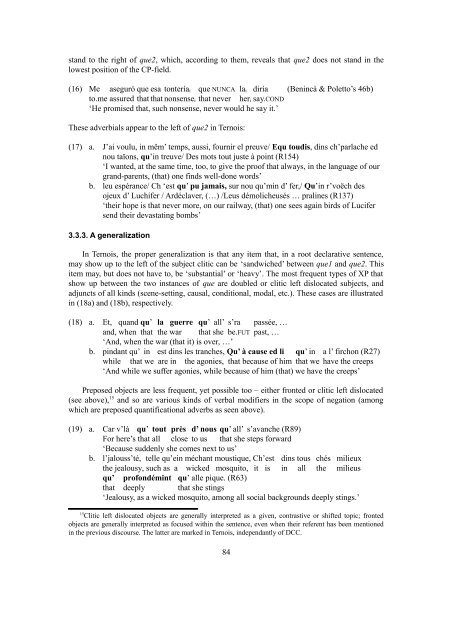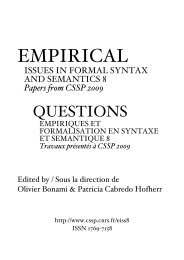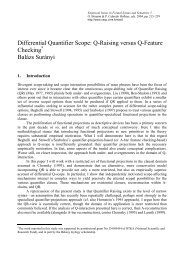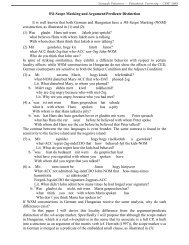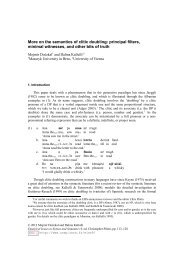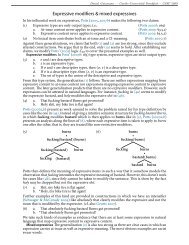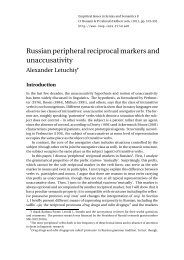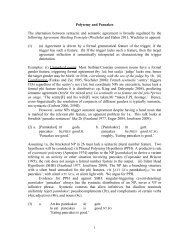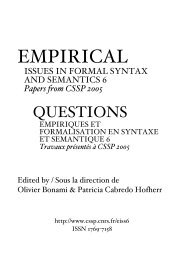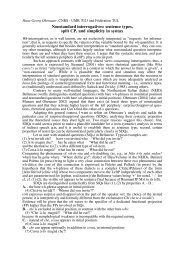Empirical Issues in Syntax and Semantics 9 (EISS 9 ... - CSSP - CNRS
Empirical Issues in Syntax and Semantics 9 (EISS 9 ... - CSSP - CNRS
Empirical Issues in Syntax and Semantics 9 (EISS 9 ... - CSSP - CNRS
Create successful ePaper yourself
Turn your PDF publications into a flip-book with our unique Google optimized e-Paper software.
st<strong>and</strong> to the right of que2, which, accord<strong>in</strong>g to them, reveals that que2 does not st<strong>and</strong> <strong>in</strong> the<br />
lowest position of the CP-field.<br />
(16) Me aseguró que esa tontería i que NUNCA la i diría (Ben<strong>in</strong>cà & Poletto’s 46b)<br />
to.me assured that that nonsense i that never her i say.COND<br />
‘He promised that, such nonsense, never would he say it.’<br />
These adverbials appear to the left of que2 <strong>in</strong> Ternois:<br />
(17) a. J’ai voulu, <strong>in</strong> mêm’ temps, aussi, fournir el preuve/ Equ toudis, d<strong>in</strong>s ch’parlache ed<br />
nou taïons, qu’<strong>in</strong> treuve/ Des mots tout juste à po<strong>in</strong>t (R154)<br />
‘I wanted, at the same time, too, to give the proof that always, <strong>in</strong> the language of our<br />
gr<strong>and</strong>-parents, (that) one f<strong>in</strong>ds well-done words’<br />
b. leu espérance/ Ch ‘est qu’ pu jamais, sur nou qu’m<strong>in</strong> d’ fer,/ Qu’<strong>in</strong> r’voëch des<br />
ojeux d’ Luchifer / Ardéclaver, (…) /Leus démolicheusés … pral<strong>in</strong>es (R137)<br />
‘their hope is that never more, on our railway, (that) one sees aga<strong>in</strong> birds of Lucifer<br />
send their devastat<strong>in</strong>g bombs’<br />
3.3.3. A generalization<br />
In Ternois, the proper generalization is that any item that, <strong>in</strong> a root declarative sentence,<br />
may show up to the left of the subject clitic can be ‘s<strong>and</strong>wiched’ between que1 <strong>and</strong> que2. This<br />
item may, but does not have to, be ‘substantial’ or ‘heavy’. The most frequent types of XP that<br />
show up between the two <strong>in</strong>stances of que are doubled or clitic left dislocated subjects, <strong>and</strong><br />
adjuncts of all k<strong>in</strong>ds (scene-sett<strong>in</strong>g, causal, conditional, modal, etc.). These cases are illustrated<br />
<strong>in</strong> (18a) <strong>and</strong> (18b), respectively.<br />
(18) a. Et, qu<strong>and</strong> qu’ la guerre qu’ all’ s’ra passée, …<br />
<strong>and</strong>, when that the war that she be.FUT past, …<br />
‘And, when the war (that it) is over, …’<br />
b. p<strong>in</strong>dant qu’ <strong>in</strong> est d<strong>in</strong>s les tranches, Qu’ à cause ed li qu’ <strong>in</strong> a l’ firchon (R27)<br />
while that we are <strong>in</strong> the agonies, that because of him that we have the creeps<br />
‘And while we suffer agonies, while because of him (that) we have the creeps’<br />
Preposed objects are less frequent, yet possible too – either fronted or clitic left dislocated<br />
(see above), 15 <strong>and</strong> so are various k<strong>in</strong>ds of verbal modifiers <strong>in</strong> the scope of negation (among<br />
which are preposed quantificational adverbs as seen above).<br />
(19) a. Car v’là qu’ tout près d’ nous qu’ all’ s’avanche (R89)<br />
For here’s that all close to us that she steps forward<br />
‘Because suddenly she comes next to us’<br />
b. l’jalouss’té, telle qu’e<strong>in</strong> méchant moustique, Ch’est d<strong>in</strong>s tous chés milieux<br />
the jealousy, such as a wicked mosquito, it is <strong>in</strong> all the milieus<br />
qu’ profondém<strong>in</strong>t qu’ alle pique. (R63)<br />
that deeply that she st<strong>in</strong>gs<br />
‘Jealousy, as a wicked mosquito, among all social backgrounds deeply st<strong>in</strong>gs.’<br />
15<br />
Clitic left dislocated objects are generally <strong>in</strong>terpreted as a given, contrastive or shifted topic; fronted<br />
objects are generally <strong>in</strong>terpreted as focused with<strong>in</strong> the sentence, even when their referent has been mentioned<br />
<strong>in</strong> the previous discourse. The latter are marked <strong>in</strong> Ternois, <strong>in</strong>dependantly of DCC.<br />
84


